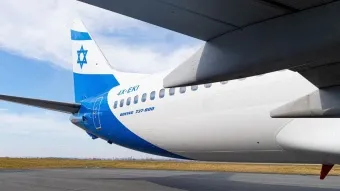While dozens of foreign airlines continue to cancel their flights to Israel - some until mid-June or even later - due to the security situation and the rocket fire from Yemen last week, Etihad Airways from Abu Dhabi is choosing to increase its capacity to Israel by operating cargo and wide-body passenger aircraft on its daily route to Tel Aviv.
Etihad has been operating three daily flights on the Tel Aviv-Abu Dhabi route continuously since the start of its operations in Israel, using narrow-body aircraft, and the flights were not interrupted even for a day during the Iron Swords war.
Now, from May 2025 until the end of June, the company will operate three daily flights, two of them using wide-body Dreamliner aircraft - a move that dramatically increases cargo and passenger capacity.
While a narrow-body aircraft allows for carrying cargo weighing only about 1-1.2 tons, a wide-body Dreamliner aircraft can carry up to 30 tons of cargo per flight. In addition, upgrading the aircraft results in an increase of about 100 passenger seats per flight - a move that expands the possibilities of combining passenger and cargo movement on commercial flights.
According to Moti Arbel, which markets Etihad Cargo represented by Rom Top in Israel, "This is a move that expresses an extraordinary level of commitment to the Israeli market, especially at a time when a significant part of the European and international companies have chosen to postpone the renewal of the lines to Israel. Etihad not only stayed, but is expanding and deepening its presence, with a long-term vision and recognition of the strategic importance of the market in Israel".
The Tel Aviv-Abu Dhabi route has become a central logistic axis in recent years for cargoes leaving Israel and reaching all over Etihad's destination network, from the Far East (including China, India, Thailand, and Japan), through destinations in Europe, Africa, the USA, and Australia. Abu Dhabi serves Israeli customers as an optimal consolidation and transit point, with short connection times, high frequency, and clear geographical advantage.
In recent months, due to flight restrictions and fewer flights by other players, Etihad has become one of the few foreign airlines that continued to serve as a central supply artery to Israel - both in the passenger and cargo sectors.
According to Moti Arbel, the upgrade to Dreamliner aircraft is not just a technical improvement in capacity - but a significant economic and strategic signal from Etihad, indicating ongoing confidence in the Israeli economy, and a desire to deepen trade, service, and transportation ties between the countries.
"Cargo customers in Israel - importers, exporters, shipping companies, and government entities - can see in this move a tangible expression of long-term commitment, especially at times when certainty is limited", adds Arbel.
According to him, Etihad's service is characterized not only by high volume, but also by operational flexibility, high availability, optimal management of timetables, and responsiveness to the special needs of sensitive cargoes - features that make it a preferred player in the changing market of 2025.
Etihad Airways Dramatically Increases Cargo Capacity to Israel
Etihad Airways is increasing its cargo capacity to Israel by operating wide-body aircraft on its daily route to Tel Aviv, despite other airlines cancelling flights due to security concerns.
11:58 ,12.05.2025
-
Found it useful? Share
-
Share on Facebook
-
Share on X
-
Share on LinkedIn
-
Share via Email
-
Share on WhatsApp
-
Print Article
Related
 20.04.2025
20.04.2025
El Al Repays State Loan, Considers Dividend Distribution
 26.03.2025
26.03.2025
Record-Breaking Financial Results for IsraelAir Group in 2024
 16.03.2025
16.03.2025
EL AL's VP Cargo at Customer Meeting: This Year Proved the Importance of El Al Cargo
 16.03.2025
16.03.2025
Israir: The Fastest Growing Airline in the Middle East
 12.03.2025
12.03.2025
El Al Reports Record Annual Net Profit of $545 Million in 2024
 10.03.2025
10.03.2025
El Al: Comprehensive Repainting of Aircraft Fleet

